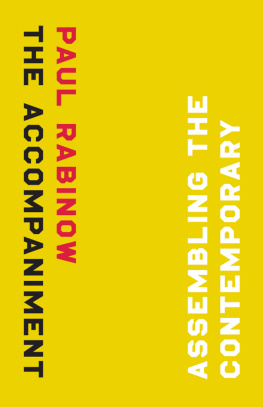Rabinow - The Accompaniment: Assembling the Contemporary
Here you can read online Rabinow - The Accompaniment: Assembling the Contemporary full text of the book (entire story) in english for free. Download pdf and epub, get meaning, cover and reviews about this ebook. City: Chicago;London, year: 2019;2011, publisher: The University of Chicago Press, genre: Religion. Description of the work, (preface) as well as reviews are available. Best literature library LitArk.com created for fans of good reading and offers a wide selection of genres:
Romance novel
Science fiction
Adventure
Detective
Science
History
Home and family
Prose
Art
Politics
Computer
Non-fiction
Religion
Business
Children
Humor
Choose a favorite category and find really read worthwhile books. Enjoy immersion in the world of imagination, feel the emotions of the characters or learn something new for yourself, make an fascinating discovery.
The Accompaniment: Assembling the Contemporary: summary, description and annotation
We offer to read an annotation, description, summary or preface (depends on what the author of the book "The Accompaniment: Assembling the Contemporary" wrote himself). If you haven't found the necessary information about the book — write in the comments, we will try to find it.
Rabinow: author's other books
Who wrote The Accompaniment: Assembling the Contemporary? Find out the surname, the name of the author of the book and a list of all author's works by series.
The Accompaniment: Assembling the Contemporary — read online for free the complete book (whole text) full work
Below is the text of the book, divided by pages. System saving the place of the last page read, allows you to conveniently read the book "The Accompaniment: Assembling the Contemporary" online for free, without having to search again every time where you left off. Put a bookmark, and you can go to the page where you finished reading at any time.
Font size:
Interval:
Bookmark:
The Accompaniment
Assembling the Contemporary
PAUL RABINOW
The University of Chicago Press
Chicago and London
P AUL RABINOW is professor of anthropology at the University of California, Berkeley.
The University of Chicago Press, Chicago 60637
The University of Chicago Press, Ltd., London
2011 by The University of Chicago
All rights reserved. Published 2011
Printed in the United States of America
20 19 18 17 16 15 14 13 12 11 1 2 3 4 5
ISBN-13: 978-0-226-70169-1 (cloth)
ISBN-13: 978-0-226-70170-7 (paper)
ISBN-10: 0-226-70169-7 (cloth)
ISBN-10: 0-226-70170-0 (paper)
ISBN-13: 978-0-226-70171-4 (e-book)
Library of Congress Cataloging-in-Publication Data Rabinow, Paul.
The accompaniment : assembling the contemporary / Paul Rabinow.
p. cm.
Includes bibliographical references and index.
ISBN-13: 978-0-226-70169-1 (cloth : alk. paper)
ISBN-10: 0-226-70169-7 (cloth : alk. paper)
ISBN-13: 978-0-226-70170-7 (pbk : alk. paper)
ISBN-10: 0-226-70170-0 (pbk : alk. paper)
1. Anthropology. 2. Interdisciplinary research. 3. AnthropologyUnited States. 4. Interdisciplinary researchUnited States. 5. Geertz, Clifford. 6. Hyman, Paul. I. Foucault, Michel, 19261984. II. Title.
GN33.R25 2011
301dc22 2010045281
 The paper used in this publication meets the minimum requirements of the American National Standard for Information SciencesPermanence of Paper for Printed Library Materials, ANSI Z39.481992.
The paper used in this publication meets the minimum requirements of the American National Standard for Information SciencesPermanence of Paper for Printed Library Materials, ANSI Z39.481992.
Contents
Introduction: Think About It
We cant go on talking to each other, said Mr. K. to a man. Why not? asked the latter, taken aback. In your presence I am incapable of saying anything intelligent, complained Mr. K. But I really dont mind, the other comforted him. That I can believe, said Mr. K. angrily, but I mind.
BERTOLT BRECHT
He who bears knowledge has only one virtue: that he bears knowledge, said Mr. Keuner.
BERTOLT BRECHT
The above are two of Bertolt Brechts Geschichten vom Herrn Keuner (Stories of Mr. Keuner), the very, very short stories that Brecht began writing during the 1920s. Herr Keuner is nicknamed the thinking man. Although Brecht never explained why he had chosen to name Mr. Keuner the thinking man, Brechts friend Walter Benjamin attempted to do so on several occasions. In a radio talk, Benjamin first interpreted the name as deriving from the Greek word keunos, meaning concerning or pertaining to everyone. An etymologically related word in Greek, koine, means everyday speech, and koinon refers to the political community. In short, these terms point to what is shared or understood by people in common. Such an interpretation is consistent, of course, and in its own distinctive way, with Brechts Marxism.
Benjamins second interpretation also involves a Greek reference. He proposed that Keuner, which as such has no particular significance, comes from the German keinerno one. Benjamin connects no one or no man to the reply that Odysseus gives the blinded one-eyed Cyclops, Polyphemus, as he escapes from the giants cave. That is to say, continues Benjamin, Mr. Keuner... is both a man of many devices like Odysseus and equally like Odysseus, is much traveled, and much enduring. Thus the name Keuner, in this interpretation, is itself a ruse, a device, camouflage for the no man undermining the class state from within, seemingly accommodating to force. This interpretation as well seems consistent with a certain style of Marxism.
Both of these interpretations, however, seem not quite right. The thinking man hardly seems to qualify as everyman in any society, and the ruses of the oppressed, weapons of the weak, whatever their other virtues, do not seem to be mainly about thinking. To be generous, I sense that Benjamin is being overly charitable to his friend; this sense is reinforced by Hannah Arendts muted criticism of the artistic fate of Brechts work when he returned from exile in the United States (with a Swiss passport at the ready) to head the Berliner Ensemble in East Germany. Brechts troubles, Arendt writes, had started when he became engag (as we would say today, but the concept did not exist then) when he tried to do more than be a voice, which was how he began. A voice of what? Not of himself, to be sure, but of the world and of everything that was real. Yet that was not enough. To be a voice of what he thought was reality had carried him far away from the real. When Brecht starting speaking for everyone in a coded language, purportedly embellished with hidden Joycean meanderings, all the effects of the real, for which he is otherwise known, were dissipated.
Where I am leading us, what is most pertinent in the first of the two very, very short stories is Mr. Keuners response. He responds with anger to the condescendingly comforting response of a man. The response is appropriate because Mr. Keuner refuses the indifference that neglects to express care for the stakes of the situation. It is also appropriate because what is at stake is virtue, intellectual virtue, as the second very, very short story recounts. He who bears knowledge has the virtue of bearing it as well as having the obligation to care for the knowledge and the bearing of it. In sum, it is perfectly proper, nay required, for a citizen (of the world) to respond with thumos, spirited anger, when that virtue is devalued through indifference or Babbitry.
...
Ever since the publication of Nietzsches 187375 Untimely Observations, philosophers and thinkers have had a new option named for them as one of the possible relations with (and to) the present and the pastthe untimely (inactuel, Unzeitgemasse). To be untimely is a mode that is interdependent with the manner in which one understands and practices observations (or interventions, betrachtungen). Consequently, there are two connected but independent terms at play here: the untimely and observations. Both are dependent, it turns out, on the mode of temporality in which, and with which, one positions oneself in the present. For Nietzsche, that timeand its ambiguous temporalitywas the contemporary. The German term for the contemporaryZeitgenossen (Zeit, time, + Genossen, companions)can be inelegantly, if correctly, translated as those who accompany us in time. Thus, to accompany others in time depends, because to accompany is a transitive verb, on where you are, where you are seeking to go, and with whom you want to be accompanied.
For Nietzsche, to be untimely meant not only to see through those things that were taken for granted by those writing during that historical period in Europe but also to diagnose the pathological symptoms and causes of their understandings. Thus, the affect associated with this use of the mode of the untimely is alternately one of pathos or thumos. For Nietzsche, at that historical moment, the main malady of the obsessions Europeans held that blinded them to their own blindness was their fetishization of history, their overvaluation of history as a privileged mode of understanding and as a privileged site of significance. Nietzsches strategy for disrupting what he took to be the complacency of those living during his time alongside him was to craft a scathing critique designed to sear through their illusions, their self-satisfactions, as well as what he took to be their other insidious moral and intellectual failings. Of course, part of the scorn that Nietzsche directed toward his contemporaries derived from his sense that he, too, until recently, had shared these same illusions.
The form that Nietzsche gave to his critique was to center on the work of specific individualsphilosophers, artists, and cultural critics (Schopenhauer, Strauss, Wagner, and so forth)a form he employed throughout his life. He shaped this form to suit an agonistic manner, a genre that often spilled over into the antagonistic. This manner of preceding is one that, once again it is worth remembering, he applied to himself as well as others; Nietzsche moved back and forth from the cut and thrust with specific individuals to diagnosing the
Next pageFont size:
Interval:
Bookmark:
Similar books «The Accompaniment: Assembling the Contemporary»
Look at similar books to The Accompaniment: Assembling the Contemporary. We have selected literature similar in name and meaning in the hope of providing readers with more options to find new, interesting, not yet read works.
Discussion, reviews of the book The Accompaniment: Assembling the Contemporary and just readers' own opinions. Leave your comments, write what you think about the work, its meaning or the main characters. Specify what exactly you liked and what you didn't like, and why you think so.









